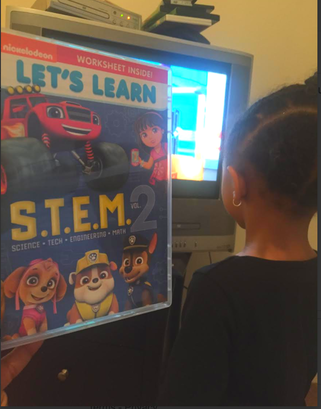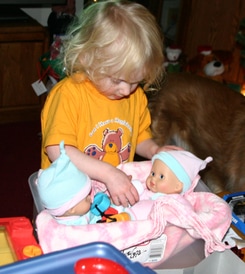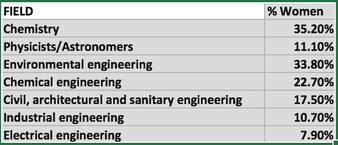The film, Hidden Figures opened up with a scene showing a little African-American girl (Katherine Johnson as a child) solving complex math problems. The first 5-10 minutes of the film showed this brilliant child whose parents were willing to do any and everything to mold her natural inclination for understanding numbers. All it took was 5 minutes and this film had tears flowing down my eyes as thoughts of my own daughter rambling off complex shapes distracted me from the screen. "Mom, that is an octahedron!" and "Hey, do you see that rhombus?" . The mother in me saw my 3 year-old daughter's face in this beautiful little actress and it increased my determination to do whatever I have to do to make sure she goes beyond the stereotype of women not being as capable as men in the S.T.E.M. fields.
According to the National Science Foundation, women make up more than half of the workforce but only make up 29% of the science and engineering workforce (NSF, Science & Engineering Indicators, 2016). Broken down by specific fields (see table below of NSF data), it is obvious that something is going on with women finding success in anything that has to do with numbers!
According to the National Science Foundation, women make up more than half of the workforce but only make up 29% of the science and engineering workforce (NSF, Science & Engineering Indicators, 2016). Broken down by specific fields (see table below of NSF data), it is obvious that something is going on with women finding success in anything that has to do with numbers!
What is going on here? Part of the problem has to deal with our biases as parents and educators. We have different expectations for our boys vs. our girls from the moment they are born (starting with the infamous "boys wear blue and girls wear pink"). This later goes beyond color of clothing and into preferences for toys. As parents and educators we are more prone to get our boys toys that allow them to learn math and science. We are GIVING our boys an upper hand in science and math from early childhood by letting them learn about force and friction from remote controlled race cars, while our girls play with dolls and toy kitchens preparing them to be a mother (or at maybe find their way in the Social Sciences making a career out of testing kids with dolls). There is evidence that boy and girls already show differences in toy preferences by 1 years old (Servin, Bohlin, & Berlin, 1999). Were we born just liking different things? Something in our DNA? Maybe. But these one year olds can barely even talk so they are not requesting different toys. So are parents providing boys and girls with different toys almost from birth? YES!!
While many of us want to believe we are egalitarian, see every one as equal, voted for what could have been our first woman president, our biases can be seen in our children's toy chests. Dolls and kitchens for girls. Race-cars, blocks and dinosaurs for boys.
While many of us want to believe we are egalitarian, see every one as equal, voted for what could have been our first woman president, our biases can be seen in our children's toy chests. Dolls and kitchens for girls. Race-cars, blocks and dinosaurs for boys.

Think about it. How many of you when looking for a good DVD to occupy your daughter's time would walk right by this jewel? With all that blue and red, and big race car in the middle, and Dora looking like she is going to fall off the cover, this most likely wont catch many parents eyes as something they would purchase for their little girls. The dogs are getting more attention being front and center than poor Dora. It is subliminal marketing such as this combined with parents unconscious biases that keep our girls away from many activities that would increase their math and science understanding.
Lets not cut our daughters' chances in what could potentially be her gift, by just giving her stereotypical girl toys and activities. In honor of the countless women in history who excelled in science and math, lets put down the dolls (we don't have to get rid of them) and pick up the race cars and blocks!
Lets not cut our daughters' chances in what could potentially be her gift, by just giving her stereotypical girl toys and activities. In honor of the countless women in history who excelled in science and math, lets put down the dolls (we don't have to get rid of them) and pick up the race cars and blocks!




 RSS Feed
RSS Feed